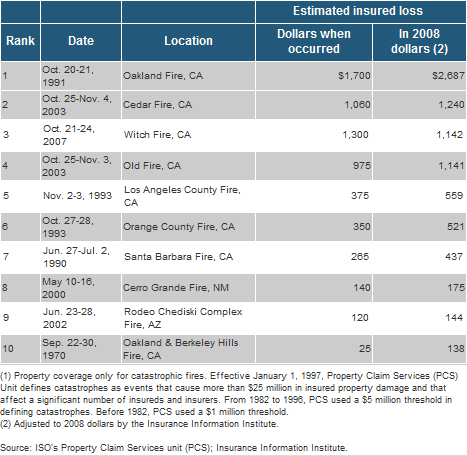Insured Property Losses in Wildfires
An interesting article appeared today at News Insurances regarding the insured property damage done by large California wildfires.
How much California wildland fire could cost to insurer?
by Barbara Karouski, News Insurances, September 1, [here]
… Nine of the ten largest wildfires, in terms of insured property losses, occurred prior to 2007, according to ISO data. [Insurance Services Office, Inc. is a leading source of information about risk, here]. A 1991 wildfire in Oakland, California tops the list with $2.687 billion in insured losses in 2008 dollars. In October 2007 a series of wildfires broke out across Southern California, damaging thousands of homes and causing widespread evacuations. The largest of these fires, the October 21 Witch fire, resulted in $1.4 billion in insured losses and was the second most damaging wildfire since 1970, in 2008 dollars. …
The article included the following chart:

The ten most costly wildland fires in the United States
The losses listed are to insured private property only. They do not include public health costs, watershed damages, crop loss, or any of the myriad other categories of economic losses associated with wildfires.
In a recent paper, (Zybach, Bob, Michael Dubrasich, Gregory Brenner, and John Marker. 2009. U.S. Wildfire Cost-Plus-Loss Economics Project: The “One-Pager” Checklist. Wildland Fire Lessons Learned Center, Advances in Fire Practices, Fall 2009) [here] the authors claimed that wildfire costs-plus-losses can exceed suppression costs by a factor of 10 to 50 times.
I compiled from various sources the estimated suppression costs (ESC) of the five most recent fires on the list above, and divided the ISO estimated insured property loss (IPL) by the suppression costs. I used the “dollars when occurred” IPL values because the suppression costs were also given in “when incurred” dollars. Remember, the IPL is only a fraction of the total damages done by wildfires.
Witch Fire (2007) ESC: $18.0 million — IPL/ESC: 72
Cedar Fire (2003) ESC: $29.9 million — IPL/ESC: 35
Old Fire (2003) ESC:: $37.7 million — IPL/ESC: 26
Rodeo Chediski Fire (2002) ESC: $43.1 million — IPL/ESC: 3
Cerro Grande Fire (2000) ESC: $33.5 million — IPL/ESC: 4
The results confirm that the costs-plus-losses of wildfires are many times the suppression costs.
Further, the total losses in each of these fires far exceed the insured property losses. For instance, the Cerro Grande Fire is estimated to have inflicted total damages in excess of $1 billion [here].
The Rodeo Chediski Fire burned 400 insured homes, but it also consumed 467,066 acres of uninsured forest and woodland. The damages from that fire to timber, water, wildlife, and public health are not reflected in the insured property loss value. Hence the low ratio (3) is also not reflective of the total cost-plus-loss from that fire.
It appears that the estimated range of the ratio (i.e. that costs-plus-losses are 10 to 50 times suppression costs) as expressed in the paper cited is an underestimate. For some fires, the costs-plus-losses can be as much as 100 times the fire suppression expenses.

Insured damage and uninsured damage. Is uninsured damage a loss to the whole of the GDP for the country? Is an uninsured loss the same as a total loss? And how does the loss accounting work for entities in the tax code. If I remember right, they are pretty limiting in the tax code. You can go back only for your gains for three years, and ahead by a set amount a year for a long time. In the end you really don’t recover anything, but just don’t have to pay quite as much tax to the feds and the state. lucky dog. But you don’t see anyone losing it all so as to gain partial compensation. Arson does not pay the tax man’s.
Is there a national figure to find out uninsured loss in relation to insured loss?